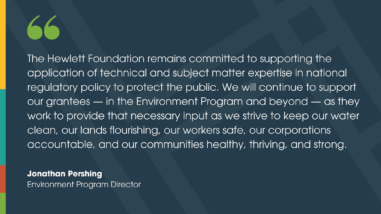International Council on Clean Transportation
For General Operating Support
-
Amount$1,930,000
-
Program
-
Date Awarded9/2/2021
-
Term24.0 Months
-
Type of SupportGeneral Support/Organization
Strategies
Overview
The International Council on Clean Transportation’s mission is to decarbonize all road transportation by 2050 and substantially decarbonize marine and aviation. It provides regulators and other key stakeholders at city, state, and national governments with research and analysis for policies that reduce emissions from vehicles. In the major vehicle markets — U.S., Europe, China, and India — the council is advancing strong electric vehicle policies at national and regional levels. (Substrategy: Electrification)
About the Grantee
Grantee Website
www.theicct.org
Address
1500 K St. NW, Suite 650, Washington, DC, 20005, United States
Grants to this Grantee
for general operating support
The International Council on Clean Transportation’s mission is to decarbonize all road transportation by 2050 and substantially decarbonize marine and aviation. It provides regulators and other key stakeholders at city, state, and national governments with research and analysis for policies that reduce emissions from vehicles. In the major vehicle markets — U.S., Europe, China, and India — the council is advancing strong electric vehicle policies at national and regional levels. (Substrategy: Electrification)
for accelerating electric vehicles in India
The International Council on Clean Transportation aims to provide regulators and other key stakeholders with research and analysis to enact policies that cut emissions from vehicles, protect public health, and minimize climate change. With this project grant, the Council will support the ambitious goal of India’s Power Minister Piyush Goyal by calling for 100 percent electrification of passenger vehicles by 2030. To put India on a pathway towards this target, it is essential to bring the stakeholders wanting to see an electric vehicle transition develop a strategic, comprehensive action plan for large-scale transportation electrification.



